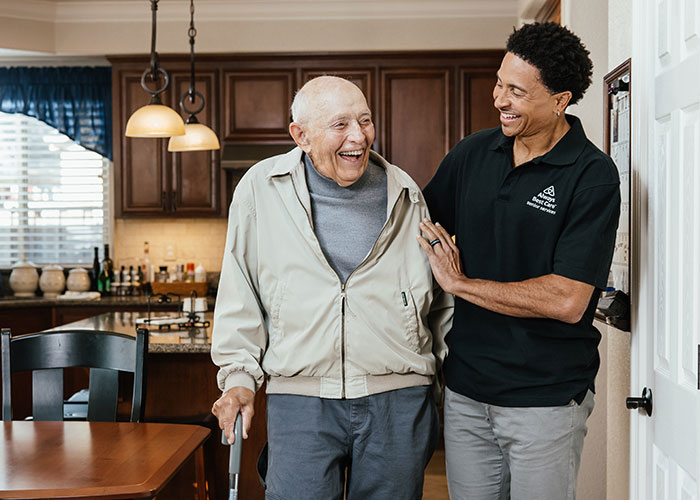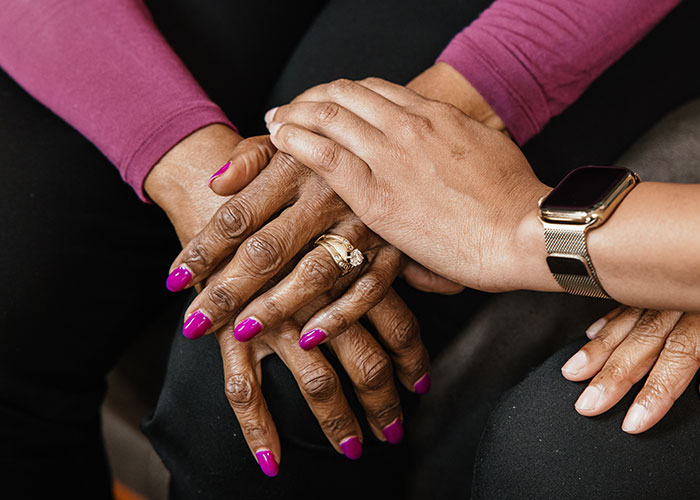5 Stages of Grief and Loss + Coping Tips for the Elderly
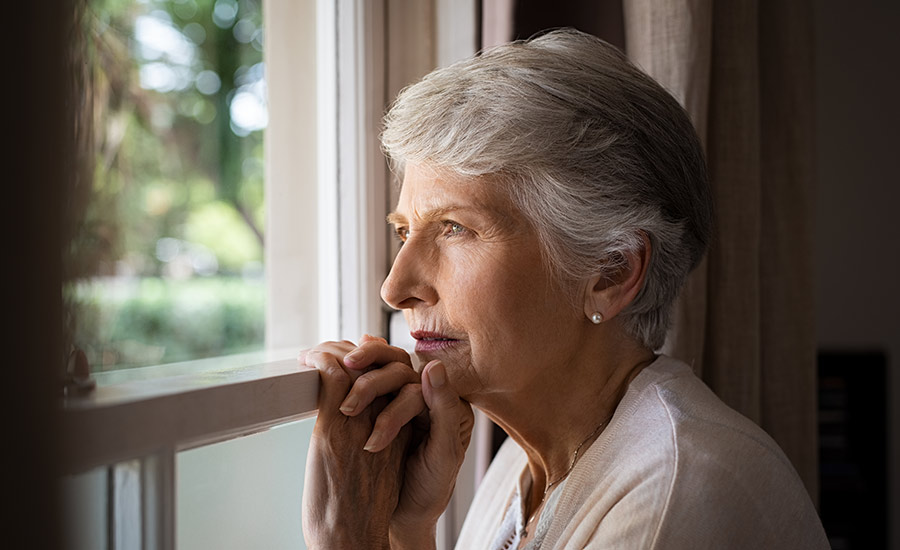
Whether your elderly loved one has lost a spouse or their beloved pet crossed the rainbow bridge, grief is a natural reaction to the loss of someone or something meaningful in one’s life.
Grieving can bring on overwhelming feelings, leading to intense and unexpected emotions like shock, disbelief, anger, guilt, and sadness.
We’ll share the different causes of grief in the elderly, the five stages of grief and loss, and how you can support your elderly loved one during this challenging time.
Table of Contents
What Is Grief?
Grief is a deep feeling of sadness or sorrow that comes from losing someone or something dear to you.
This emotional response can manifest in different forms, including emotional pain, longing, and a profound sense of emptiness.
Grief often leads to a period of mourning and adjustment as individuals come to terms with their loss.
Why Do the Elderly Grieve Differently?
The elderly may grieve differently for several reasons, each related to their unique circumstances and life stage:
- Multiple Losses: Seniors often experience several losses throughout their lifetime. This includes the deaths of spouses, friends, and sometimes children. The collective effect of these losses can alter their grieving process, making it more complex and sometimes harder to resolve.
- Isolation: As people age, they may face increased isolation due to decreased mobility, retirement, or the loss of peers. This isolation can affect how they grieve, potentially intensifying feelings of loneliness and sadness.
- Cognitive and Physical Decline: Cognitive impairments, such as those caused by dementia, can modify the elderly’s ability to understand or cope with loss. Physical ailments, such as chronic pain, can also make it difficult to participate in social or therapeutic activities that could help with grief.
- Resilience and Acceptance: Elderly individuals from the Silent and Baby Boomer generations display resilience — often developed through overcoming numerous life challenges. This resilience frequently helps them move more swiftly to stages of acceptance and adaptation.
- Reflection on Mortality: The elderly are more likely to reflect on their own mortality during times of loss. This can introduce a different dimension of grief, intertwined with personal fears about death, existential questions, and concerns about what lies ahead.
Common Causes of Grief in the Elderly
Grief and loss in the elderly can stem from various events and circumstances, often more complex due to their stage in life. Here are some common causes:
- Death of a Spouse or Partner: Losing a spouse or partner is one of the most profound losses an elderly person can experience, marking the end of a lifelong companionship. This loss can deeply affect nearly every aspect of their daily life, impacting their social interactions and emotional well-being.
- Death of a Pet: For many seniors, pets are more than companions — they provide comfort and a sense of purpose. Losing a pet can be as emotionally intense as losing a significant other, affecting their well-being and daily life.
- Loss of Friends and Peers: As people get older, they may lose peers more often. Losing friends you relied on can be painful, especially when you’ve shared many precious memories together.
- Declining Health: Reduced physical independence and the onset of health conditions can cause distress, often leading to grief over the loss of their younger, healthier self.
- Cognitive Decline: Conditions such as Alzheimer’s and other types of dementia can lead to profound feelings of loss due to declines in clear thinking and memory.
- Retirement: Retirement can be a challenging adjustment for seniors, as it involves the loss of routine and a sense of purpose or identity.
- Loss of Independence: Whether it’s losing the ability to drive or engage in various physical activities that your elderly loved one used to enjoy, the loss of independence can cause grief and lead to feelings of frustration, sadness, and isolation.
- Financial Insecurity: Changes in financial status due to retirement or medical expenses can lead to stress and anxiety. This causes grief over the loss of security and autonomy.
- Relocation: Moving out of a long-term home into assisted living or a nursing facility can trigger grief. This change often represents a loss of a familiar environment, independence, and sometimes even personal belongings that hold sentimental value.
5 Stages of Grief and Loss
The five stages of grief, also known as the Kübler-Ross model, describe the process individuals go through when dealing with grief and loss.
The five stages of loss and grief are:
1. Denial
The first stage of grief is denial. During this period, individuals may believe there has been a mistake and cling to a false, favorable reality.
Denial serves as a defense mechanism, as it cushions the initial shock of the distressing event.
Examples of denial include refusing to acknowledge the death of a loved one and avoiding discussions about the topic.
2. Anger
The second stage of grief is anger. During this stage, individuals often feel intense frustration and irritation.
This anger may be directed at themselves, other people, the circumstances surrounding the loss, or even inanimate objects.
It’s a way for those grieving to express the pain and helplessness they feel, as they begin to confront the reality of their loss.
Anger can manifest in different ways, including self-blame or feeling angry with oneself over the loss.
3. Bargaining
The third stage of grief is bargaining. During this period, individuals often try to regain control or find meaning by thinking through “what if” and “if only” scenarios.
Your elderly loved one may dwell on what could have been done differently to prevent the loss and even imagine ways to undo it. This stage reflects a deep yearning for a different outcome.
Bargaining often involves making promises to change behaviors or offering sacrifices in hopes of reversing the loss. For example, an individual might vow to spend more time with family instead of being consumed by work.
4. Depression
The fourth stage of grief is depression. During this stage, individuals often feel guilt and hopelessness.
This period is marked by a slow, often painful adjustment to the new reality of living without the person or thing they have lost.
Your elderly loved one may withdraw from social interactions and lose interest in activities they used to enjoy.
5. Acceptance
The fifth stage of grief is acceptance. During this period, individuals come to terms with their loss and start finding ways to move on.
They weave their grief into their daily lives and begin to feel a sense of peace or resolution.
For example, your elderly loved one may focus on cherishing shared memories and making plans to live a fuller, happier life.
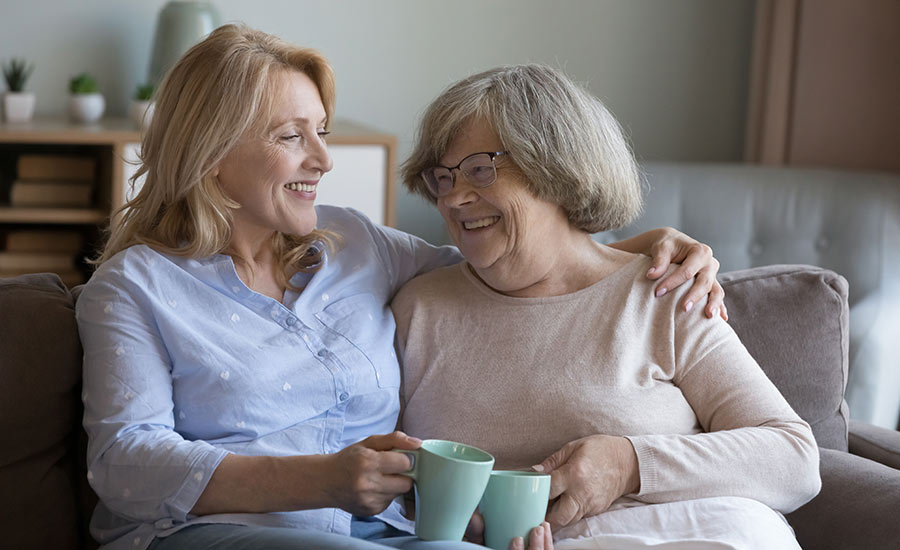
How to Help Your Elderly Loved One Deal with Grief and Loss
Supporting an elderly loved one through grief and loss can be challenging. But with the right approach and resources, you can provide valuable and meaningful assistance during this difficult time.
Here are ways you can help:
- Invite your elderly loved one to share their thoughts and feelings. This can help show your concern for your loved one, especially during tough or stressful times. You can say, “It’s alright to talk about how you’re feeling. I’m here to listen.”
- Keep your loved one engaged by sharing positive updates from your life and the world, which can help distract them from their grief. Not every conversation needs to focus on their loss. Sharing uplifting stories can boost their spirits and keep them connected to family and the community.
- Help your elderly loved one maintain their daily routines to provide a sense of stability and structure. For example, you can help by shopping for groceries, handling paperwork, or accompanying them to a weekly social event.
- Encourage your elderly loved one to catch up with friends and support groups where they can connect with others experiencing similar losses. Knowing that they aren’t alone can help increase socialization, foster a sense of community, and promote healing.
- Regularly keep an eye on their eating and sleeping habits, and encourage light exercises, such as taking a stroll in the nearby park. This can help improve their physical health, boost mood, and enhance overall well-being
- Consider talking to a grief counselor, therapist, or psychologist if your elderly loved one is struggling to deal with grief. These professionals can help guide them through the complexities of grief. They are also equipped with the skills, knowledge, and experience to provide effective coping strategies and emotional support.
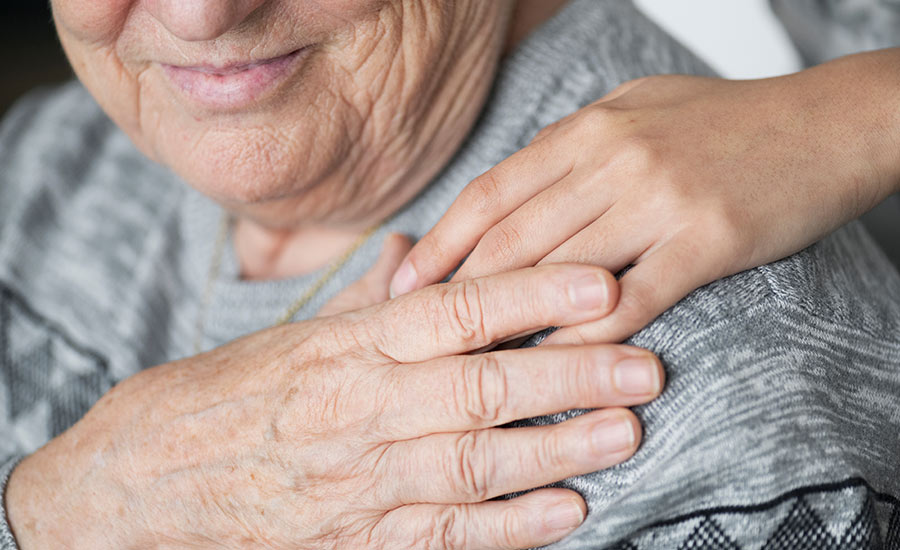
Explore Compassionate Senior Care Services at Always Best Care
As people go through grief and loss, the severity of their symptoms often become less severe as they learn to adapt to life following their loss.
However, keep in mind that these stages of grief aren’t absolute. Individuals may not experience them in the same way or may not go through them at all.
At Always Best Care, we’re here to help your elderly loved one navigate their way through grief by providing dedicated senior care services.
Our dedicated team offers emotional support, companionship, and tailored activities that foster a sense of connection and purpose.
We understand that everyone processes grief differently. We’re committed to creating a supportive environment that respects their dignity and aids in the healing process.
Our services include:
- In-home care services: We provide companionship, 24-hour care, safety supervision, bathing and grooming, light housekeeping, and transportation services to help make tasks a little easier for your elderly loved one.
- Skilled home health care services: We build tailored care plans for chronic conditions, managing your loved one’s medical needs in select areas.
- Specialized home care services: We ensure daily social interactions and health care guidance right at home, using advanced technology like personal emergency response systems, balance tracking systems, and remote patient monitoring to manage symptoms effectively.
- Respite care services: We provide flexible support, from short breaks to longer care periods, giving you time to recharge from your caregiving duties.
- Dementia care services: We offer compassionate care that focuses on the comfort and well-being of individuals with dementia.
- Senior living referral services: We help you find the best senior living communities that match your loved one’s needs and preferen. We’re here to give a helping hand to veterans so they can obtain financial aid for their care. It’s our way of saying thank you for their service and ensuring they receive the support they deserve.


